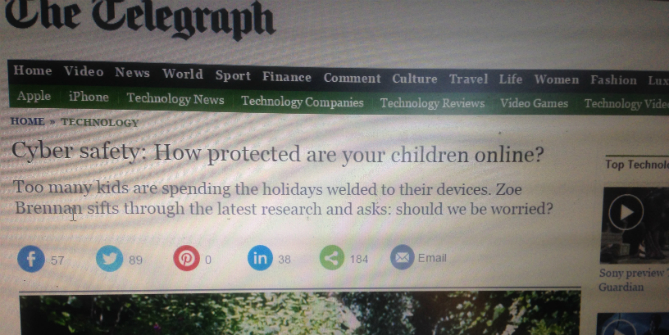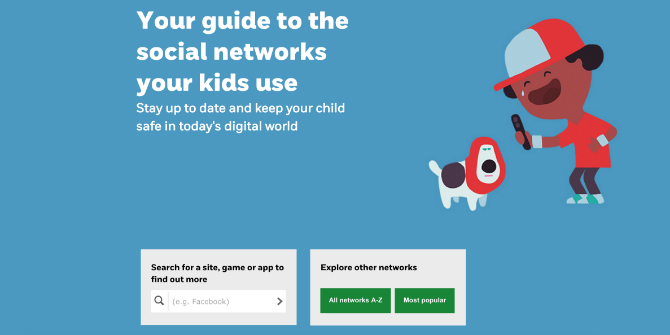Eagle-eyed readers may have spotted one of three major press stories featuring our research on parenting and technology last week.
Sonia was featured in an article in the Telegraph on Cyber safety: How protected are your children online? In it, journalist Zoe Brennan worried about the heavy reliance she and her children (teenagers and a toddler) have developed on ‘screen time’ during the school holidays. Brennan discussed maintaining a balance between outdoor activities and time spent on devices, and also the luxury that screens afford parents to get a little time for themselves.
Sonia provided evidence from our research (some with colleagues across the EU) that:
- British parents have a high rate of early adoption of devices, but less knowledge of what kids actually do online
- Tablets are hugely popular, especially for gaming and as a distraction for very young children who cannot yet work a computer, but parents don’t often consider what apps are installed or how they are used
- Parents in other countries, especially in Scandinavia, often prioritise using the web alongside their children, encouraging creativity online rather than just policing safety
The article concludes with a set of practical recommendations. Especially, as Sonia is quoted saying, that parents “get into [your children’s] world… Have one point in the week where you all just have fun on the internet.”
I (Alicia) appeared on BBC Radio 4 and on a BBC2 news programme on A-level results day, an often fraught day when A-level students in the UK simultaneously receive their exam results.
On the Today Programme on Radio 4 I discussed ‘sharenting’ and whether parents should share their child’s A-level results online (last 5 minutes of broadcast).
I also appeared on the Victoria Derbyshire programme on BBC2 (segment starts at 24:11) to talk not only about parents but also young people sharing results online. I joined two young people, one of whom had published a video of her opening her A-level results on her YouTube channel last year (and has now gained 50,000 views), and another who had shared his results on social media that day.
Kate, whose YouTube channel at the time was only watched by friends and family, said at first the comments were all supportive. Many appreciated her honesty in showing her disappointment in not getting the results she wanted. However, as more people watched the video she got increasing numbers of critical comments. She didn’t regret having posted but wasn’t prepared for what might happen.
My advice was to consider:
- For parents posting – is this your story to tell? Some young people have a different relationship to privacy than their parents so involve them in the decision about what is appropriate to share, how and to whom
- How can you be a good ‘digital citizen’ and celebrate or commiserate without making others feel bad? Many parents we interview talk about feeling a sense of ‘competition’ with other parents, which can be exacerbated by social media. Kate had friends tell her that she was brave in being so honest, but others told her that her distress at her (comparatively good) results made them feel bad about their own
- Think about the future – increasing numbers of university admissions officers and potential employers say they ‘google’ candidates and check their social media profiles. It’s worth thinking through whether you are happy for everything you share about yourself or your child to remain online, potentially in perpetuity
I encouraged parents and young people to access the opportunities of the internet, to find emotional support, celebration or practical ways of getting information (including negotiating the stressful Clearing process to find new places if needed) but to be mindful of how, when and why to share.
Finally, an interview that Sonia did for the Motherland podcast was released – on the theme of kids and technology (what else?). Together with Charlotte Philby and Technology Will Save Us co-founder Bethany Koby (for more, listen here), the focus was on whether and how tech can be a force for good in children’s lives. Her key points were that:
- Children’s lives have become highly constrained in their freedom to go out and see their friends so no wonder that they have embraced the internet with such enthusiasm – to find new ways to hang out with friends online
- Children find ways to use the internet betwixt and between opportunities and risks – they are exploring the risky opportunities of the internet
- Parents worry about their children staring at the screen, but didn’t they do the same in the past for those kids who always ‘had their nose in a book’ or might get ‘square eyes’ from too much TV? What matters is the content, and how they engage with it, surely? We need a better grasp of what really stimulates children’s imagination
- If parents try to manage their child’s internet use by restrictions or bans, their child is less likely to come to them for help when they do encounter a problem, so ironically, protective approaches can leave a child less protected
- Many of the struggles we have seen between parents and children apply especially for teenagers – now that very young children are going online it’s a great opportunity to build a trusting parent-child communication about the internet before teenage troubles arrive
- She ended by pointing at some great resources to support parents in managing their children’s internet use
From the feedback we’ve had from these stories it’s clear that both the ethics and practicalities of parenting with and through technology are topics on everyone’s minds at the moment. We are glad to be able to signpost parents and educators to resources and the latest research (including our own) through media appearances and through this blog, and will continue to update on further ‘breaking news.’






